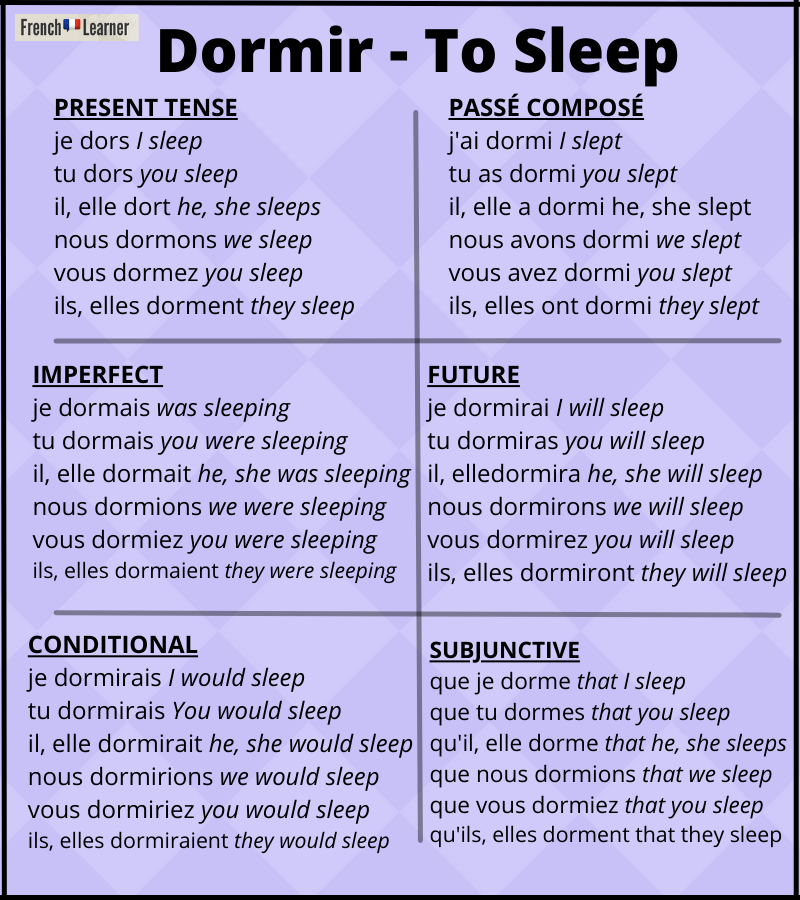The conjugation of dormir (Meaning: to sleep in French; Pronunciation dɔʀmiʀ) is: Je dors (I sleep), tu dors (you sleep), il/elle dort (he/she sleeps), nous dormons (we sleep), vous dormez (you sleep) and ils/elles dorment (they sleep). This page provides conjugation charts for dormir in six major verb tenses.

Dormir is an irregular -ir verb. This means that its endings are different from regular -ir verbs when conjugated in the present tense. It’s present tense end are: -s, -s, -t, -ons, -ez and -ent.
The past participle of dormir is dormi (slept) and the present participle is dormant (sleeping).
This page covers conjugations for dormir in the following tenses:
- Present tense (le présent)
- Compound past (le passé composé)
- Imperfect (l’imparfait)
- Simple future (le future simple)
- Conditional (le conditionnel)
- Subjunctive (le subjonctif)
Dormir conjugation table
The following is conjugation table offers of quick overview of dormir. Below we’ve provided complete conjugation charts with example sentences.

Dormir conjugation charts
The following section offers conjugation charts for dormir in six major tenses with example sentences.
Present tense (le présent)
In the present tense, je dors translates to “I sleep” and “I am sleeping”.
| Je dors | I sleep | Je dors dans mon lit. | I sleep in my bed. |
| Tu dors | You sleep (informal, singular) | Tu dors dans ta chambre. | You sleep is your bedroom. |
| Il/elle dort | He/she sleeps | Il dort chez sa maman. | He sleeps at his mom's place. |
| Nous dormons | We sleep | Nous dormons dans un très bon hôtel. | We sleep in a very good hotel. |
| Vous dormez | You sleep (formal, plural) | Vous dormez dans une tente. | You sleep in a tent. |
| Ils/elles dorment | They sleep | Ils dorment dans des sacs de couchage. | They sleep in sleeping bags. |
In the following video online French teacher, Alexa, teaches the pronunciation of dormir in the present tense:
Compound past (le passé composé)
The passé composé (compound past) is a commonly used past tense used to describe actions which occurred at specific times. J’ai dormi translates to “I slept”.
| J'ai dormi | I slept | J'ai bien dormi hier soir. | I slept well last night. |
| Tu as dormi | You slept (informal, singular) | Tu as mal dormi hier soir. | You slept poorly last night. |
| Il/elle a dormi | He/she slept | Il a dormi chez ses parents. | He slept at his parents house. |
| Nous avons dormi | We slept | Nous avons dormi dans un grand lit. | We slept in a big bed. |
| Vous avez dormi | You slept (formal, plural) | Vous avez dormi dans un hôtel de luxe. | You slept in a luxurious hotel. |
| Ils/elles ont dormi | They slept | Ils ont dormi dans un camping. | They slept in a campsite. |
Imperfect (l’imparfait)
The imperfect tense (l’imparfait) is used to express actions which occurred in the past at unspecified times.
| Je dormais | I was sleeping, used to sleep | Je dormais quand tu es retourné. | I was sleeping when you returned. |
| Tu dormais | You were sleeping, used to sleep (informal, singular) | Tu dormais mieux quand tu étais plus jeune. | You used to sleep better when you were younger. |
| Il/elle dormait | He/she was sleeping, used to sleep | Avant, il dormait chez elle. | Before he used to sleep at her place. |
| Nous dormions | We were sleeping, used to sleep | Nous dormions quand le téléphoné a sonné. | We were sleeping when the phone rang. |
| Vous dormiez | You were sleeping, used to sleep (formal, plural) | Vous dormiez quand je vous ai reveillé. | You were sleeping when I woke you up. |
| Ils/elles dormaient | They were sleeping, used to sleep | Ils dormaient dans la tente quand l'ours a apparu. | They were sleeping when the bear appeared. |

Simple future (le future simple)
In French, the simple future (le future simple) tense is used to express future actions. Je dormirai translates to “I will sleep”.
| Je dormirai | I will sleep | Je dormirai dans mon lit ce soir. | I will sleep in my bed tonight. |
| Tu dormiras | You will sleep (informal, singular) | Tu dormiras chez tes grand-parents ce weekend. | You will sleep at your grandparents' house this weekend. |
| Il/elle dormira | He/she will sleep | Elle dormira dans son pyjama ce soir. | She will sleep in her pyjamas ce soir. |
| Nous dormirons | We will sleep | Nous dormirons dans un hôtel très cher pendant nos vacances. | We'll sleep in a very expensive hotel during our vacation. |
| Vous dormirez | You will sleep (formal, plural) | Vous dormirez chez votre tante la semaine prochaine. | You'll sleep at your aunt's house next weekend. |
| Ils/elles dormiront | They will sleep | Ils dormiront dans la chambre d'amis ce soir. | They'll sleep in the guest room tonight. |
Conditional (le conditionnel)
The French use the conditional tense (le conditionnel) to express hypothetical situations which “would” occur.
| Je dormirais | I would sleep | Je dormirais jusqu'à midi si c'était possible. | I would sleep until noon if it were possible. |
| Tu dormirais | You would sleep (informal, singular) | Tu dormirais dans ton propre lit si tu étais chez toi. | You would sleep in your own bed if you were at home. |
| Il/elle dormirait | He/she would sleep | Elle dormirait jusqu'à dix heures mais elle doit se lever tôt. | She would sleep until 10 o'clock but she has to get up early. |
| Nous dormirions | We would sleep | Nous dormirions dans cet hôtel si c'était moins cher. | We'd sleep in this hotel if it were less expensive. |
| Vous dormiriez | You would sleep (formal, plural) | Vous dormiriez dans une tente si vous aimiez le camping. | You'd sleep in a tent if you liked camping. |
| Ils/elles dormiraient | They would sleep | Ils dormiraient bien si les voisins ne faisaient pas tant de bruit. | They'd sleep well if the neighbors weren't making so much noise. |
Subjunctive (le subjonctif)
The French language uses the subjunctive mood (le subjonctif) to express wishes, emotions and doubts. Que je dorme translates to “that I sleep”.
| que je dorme | that I sleep | Il faut que je dorme un peu plus. | I need to sleep a bit more. |
| que tu dormes | that you sleep (informal, singular) | Je veux que tu dormes dans cette chambre. | I want you to sleep in this room. |
| qu'il/elle dorme | that he/she sleeps | Je doute qu'elle dorme assez. | I doubt she's sleeping enough. |
| que nous dormions | that we sleep | Il est heureux que nous dormions bien. | He's happy we're sleeping well. |
| que vous dormiez | that you sleep (formal, plural) | Je ne pense pas qu'il dorme dans ce lit. | I don't think he's sleeping in this bed. |
| qu'ils/elles dorment | that they sleep | Je suis content qu'ils dorment dans cette auberge. | I'm happy they're sleeping in this inn. |

